The death of Johnny Kidd seemed like the end of the world! The following days were spent in a kind of twilight, punctuated by visits from various friends and well-wishers, including a couple of office girls from Rymans, my previous employer. I couldn’t do a lot at the time, my left arm being damaged, my nose broken, amongst various injuries to my head, back and neck. The other pirates had been commandeered by Kidd’s old bassist, Johnny Spence, for a tour backing Jerry Lee Lewis, where only Mick Stewart got to perform. Jerry Lee had his U.S. bassist and drummer, but the others had to be there to uphold one of the many daft rules that the Musician’s Union had laid down. Poor Johnny Irving was devastated, blaming himself for not being there to drive Kidd as he had always done, and he immediately renounced all connections with the music business that had been his livelihood for so many years, turning down jobs offered by such giant acts as The Shadows and The Who!
Still in a state of shock, I agreed to join Mick and Solly in carrying on the Pirates, which we unanimously decided was what Johnny would have wanted. As soon as I was well enough we began to plan our future, which was given a boost with the offer of a month-long tour backing a visiting U.S. star. Bobby Hebb had enjoyed success in his own country before breaking through in Britain with his self-penned song “Sunny”. Also covered by own Georgie Fame, Sunny was a hit on both sides of the Atlantic, and Bobby was riding high! Shortly before rehearsals were due to start, drummer Roger Truth decide to join a touring soul extravaganza called “The Mack Sound”, a fourteen-strong band led by the former U.S. light-heavyweight boxing championship contender, Freddy Mack. A replacement was quickly recruited in the form of Kenny Slade, a terrific drummer from Sheffield who had previously played in Joe Cocker’s band.
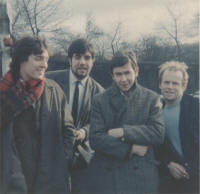
On the day appointed to meet Bobby Hebb, the three of us assembled in a dingy basement rehearsal room in Denmark Street, London’s Tin Pan Alley. A small charismatic looking black man suddenly descended the stairs, carrying a huge wad of sheet music under his arm. After swift introductions, Bobby then enquired as to when the brass section would arrive. His face was a study when we informed him that we were the band, in total! Angry exchanges then followed on the telephone to the promoter’s office, from whence a keyboard player was quickly dispatched to augment the Prates trio. By the time Johnny Goodison arrived, complete with Vox Continental organ, it was too late to rehearse, so Bobby gave us all a list of songs, together with sheet music to be studied in preparation for the next day’s rehearsal. Panic rapidly set in, as none of us were very adept at sight-reading, and I swiftly set off for Jim Marshall’s guitar shop, where his son Terry helped me to decipher the bass lines.
Following a sleepless night, I met the others once more in Denmark Street where Bobby Hebb introduced us to his act. He seemed to have got over his disappointment at the lack of brass players and made a great effort to put us at ease. Most of his set was not too demanding, although I struggled at first with “Sunny”, which was built on an all-important bass line. Patiently, Bobby taught me the song note for note, pointing out the mistake that the studio bassist had made on the record. John Goodison proved to be a solid, reliable musician. He was a veteran player, leading his own outfit called Johnny B. Great and the Quotations, backing the Walker Brothers, probably the biggest act in the business at that time.
On the following Thursday, December 1st 1966, the tour opened to a capacity crowd at the Streatham Locarno Ballroom in South London, where we nervously wobbled through the show to Bobby’s satisfaction. By 11:30 p.m. we had moved on to Blaize’s nightspot in London’s West End, where it seemed that the whole music business had turned out to see this new American star. Bobby rose to the occasion, as did the Pirates, and we delivered a pretty good show. Solly was in the audience with his new boss, Freddy Mack, who proved to be a likeable giant of a man, and we immediately struck up a rapport.
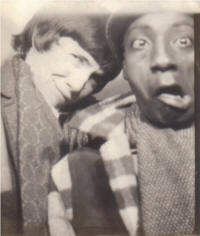
From then on it was hard graft all the way as the tour zigzagged across England and Wales, and poor Bobby Hebb realized just what he had signed up for! In time-honoured fashion, the Prates-Hebb showcase followed that bizarre route so beloved by British tour promoters, with no thought given to distances covered or almost impossible schedules which were the artists’ responsibility to keep up with! The offer of good regular wages seemed fine in theory, but the reality was a hard slog of constant driving (with no motorways in those days), eating in foul greasy spoon cafés and sleeping in lousy run-down guest houses which would never get a licence to operate today! This was a dreadful culture shock to poor Bobby, a fact which was made more apparent to me when I first visited the U.S. in 1968. Even the cheapest American motels were luxurious by comparison, and the abundance of good quality 24 hour road-side diners were a positive joy to eat in! No, Bobby was not a happy man, obviously very homesick and missing his fiancée. Although used to the extreme temperatures of America’s East Coast, he seemed troubled by the dampness of a typical English winter. In spite of these problems, though, he kept cheerful and proved to be good company on the road.
The tour was exceptionally tough for me too, being the only driver in the band. Our tight-fisted promoter provided no road crew or assistance whatsoever, so not only did I have to drive the van, usually with the others fast asleep in the back, but also set up my own equipment. The worst night was when we appeared at the Pavilion Ballroom in Bath, Somerset on December 5th. The journey up from London was hampered by stormy weather, and thirty miles before our destination the windscreen wipers failed! By leaning forward with my right arm out of the window, I had to operate the wipers manually. Of course, by the time we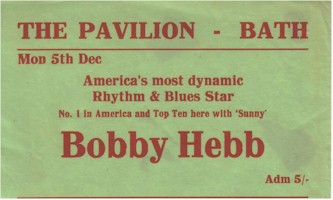 arrived my whole arm was numb and turning blue! After the gig I drove the band out of Bath as fast as possible, having been summoned to appear at Manchester Crown Court the next day, where Johnny Kidd’s friend Wilf was due to face a charge of causing death by dangerous driving. Unaware that I could have altered the court date, I had worked out that by driving non-stop back to London, then non-stop to Manchester, I could just make it in time! I had telephoned my girlfriend Janet from Bath to ask her to accompany me on the journey (to keep me awake), but, wisely, her parents had forbidden it, and so after dropping off the others as dawn broke, I departed Hayes alone for the North in my trusty Austin mini-van. The court experience was rather intimidating, the first time I had been in a court presided over by a bewigged judge and barristers. Although summoned by the police as a prosecution witness, I was of little use to them. I gave my evidence as I had seen it, telling how Wilf’s driving had been faultless, and adding that in my opinion the same thing could have happened if Stirling Moss had been at the wheel! The police were determined however that someone had to be blamed, and sadly Wilf was found
arrived my whole arm was numb and turning blue! After the gig I drove the band out of Bath as fast as possible, having been summoned to appear at Manchester Crown Court the next day, where Johnny Kidd’s friend Wilf was due to face a charge of causing death by dangerous driving. Unaware that I could have altered the court date, I had worked out that by driving non-stop back to London, then non-stop to Manchester, I could just make it in time! I had telephoned my girlfriend Janet from Bath to ask her to accompany me on the journey (to keep me awake), but, wisely, her parents had forbidden it, and so after dropping off the others as dawn broke, I departed Hayes alone for the North in my trusty Austin mini-van. The court experience was rather intimidating, the first time I had been in a court presided over by a bewigged judge and barristers. Although summoned by the police as a prosecution witness, I was of little use to them. I gave my evidence as I had seen it, telling how Wilf’s driving had been faultless, and adding that in my opinion the same thing could have happened if Stirling Moss had been at the wheel! The police were determined however that someone had to be blamed, and sadly Wilf was found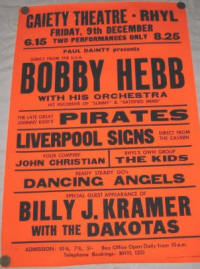
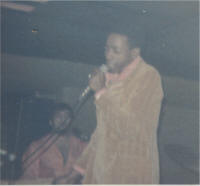
One week later, Saturday December 10th, I experienced another bad day when the tour arrived at the Imperial Ballroom, Nelson, Lancashire. It was barely a month since I had arrived in the company of Johnny Kidd, and it felt strangely surreal to be back so soon. I had little time to dwell on that dreadful event in October however, as we had to leave swiftly to perform at Nottingham on the same night. Originally we were scheduled to play at Widnes in between Nelson and Nottingham, but the gig was cancelled when our hard-driving promoter realized the impossibility of three shows in one night!
The Nelson gig had gone well, apart from an unsavoury incident when a local hooligan took exception to Bobby’s colour and began hurling abuse from the font of the stage. Slowly, the huge bear-like figure of Johnny Goodison removed his microphone from its stand, and grasping it like a spear, strode to the front and informed the heckler of what would happen if he continued. The punter wisely got the message and rapidly disappeared, but it was a disappointing moment for all of us, although thankfully the only bad incident of the whole tour.
As we left Nelson, my sombre mood evaporated and by the time we reached Nottingham, although tired, we were fired up for the next show. The audience at the Dungeon Club all-nighter was mainly composed of West Indians, and they gave Bobby Hebb a rapturous welcome. He pulled out all the stops, demonstrating his skills on guitar, bass, drums and spoons, and they loved him! A truly great all-rounder, he thoroughly deserved the standing ovation that he received at the end of the show. As Bobby sped back to London, being driven in the ageing Ford Cortina generously supplied by the promoter, I followed behind with only the pinches and punches of Mick Stewart keeping me awake. After 4 hours sleep we were off again for a lunch-time show at Brixton’s Ram Jam Club. By no stretch of the imagination could this rock ‘n’ roll lifestyle be termed glamorous! An assault course was nearer the mark!
And so the tour ploughed on, some of the gigs being at seaside ballrooms on the end of the piers, those odd, quintessentially British establishments, which sadly are fast disappearing. Sometimes I wondered, as I gingerly nursed the van across rotting planks which made up the pier walkways, whether we would get to the end without plunging through into the sea below! If you made it safely to the ballroom, there were often hazardous electric circuits to contend with in these ancient establishments. Experienced musicians always took care never to touch guitar strings and microphones at the same time, as this could often result in a severe shock, and fatalities were not unknown!
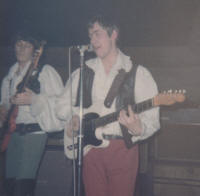
In Rhyl, Wales, we shared the bill with Billy J. Kramer and the Dakotas, a huge name at the time, being handled by Beatles manager Brian Epstein. In spite of all his hits, Billy seemed plagued by insecurity and self-doubt, but came across as a really nice man. Backstage, I renewed my acquaintance with Mick Green, the Dakotas’ ace guitarist who had made his reputation during the short time he worked with Johnny Kidd. He said that he could not think of Johnny as being gone – just gigging somewhere up the road! A nice sentiment I thought.
In London, we played a recently opened venue called Tiles. Underneath Oxford Street, it was comprised of a subterranean collection of shops, a disco and ballroom. A great idea which, sadly, did not last for long. Another memorable London gig was at Samantha’s Disco, which epitomized the whole swinging London scene, where the records were played on a deck fitted inside the cockpit of an E-type Jaguar sports car by a selection of mini-skirted teenage girls. One of these lovely ladies, named Francesca, had a brother-in-law named Anthony Edwards, who at that time could have had no idea that he would soon be managing a new band called Deep Purple! Johnny B. Great was on particularly fine form at Samantha’s, knocking ‘em dead, as the saying goes, with Phil Upchurch’s “You Can’t Sit Down”, and the other monster instrumental hit of the day, Booker T’s “Green Onions”, prior to Bobby Hebb taking the stage.
Back up north, Bobby was excited to be playing at the world-famous Cavern Club in Liverpool, where the Beatles had begun their rise to fame. Sadly though, there was little glamour to be found at the Cavern, a dingy depressing cellar with abysmal acoustics!
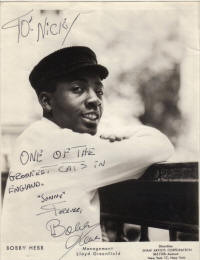
As the tour drew to a close, just before Christmas 1966, Bobby’s spirits began to lift as he knew that he would soon be going home. I felt that he had not really enjoyed his first taste of Britain. Back in the U.S.A. he was a star, and deservedly treated like one, but in England he was just another commodity to be sold on for maximum profit. Socially, however, it had been a successful experience, with the new Pirates line-up and Bobby Hebb having enjoyed one another’s company and music immensely. Mick Stewart and I both agreed that we had learned a lot by sharing the stage with Johnny B. Great and ace drummer Kenny Slade, and we put it to them that this line-up had an excellent future together. Naturally we were very pleased when they both expressed similar sentiments, and so we agreed to meet up after the Christmas break and formulate a plan for the coming year.
I said a sad goodbye to Bobby at Heathrow Airport. A month is not very long, but during the intensity of a hectic tour, with people living and working in close proximity, it’s almost impossible not to forge some sort of bond. I never saw Bobby again, although we corresponded by letter several times. He never repeated his success, but “Sunny” went on to become one of the most covered tunes in the history of popular music – a well-deserved success for one of the nicest people that I had the pleasure of working with.
| Chapter 10 ← | → Chapter 12 |
